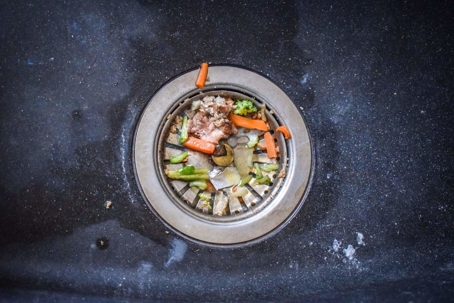Your drains play an important role in your home—they carry away wastewater and other debris down to your sewer or septic tank. In the case of your kitchen drain, this can often include food particles which are ground up and washed away by your garbage disposal. Garbage disposals are pretty integral parts of your kitchen, as they make food waste easier, safer, and more sanitary to dispose of.
However, a garbage disposal is not an all-encompassing way of disposing of all types of food waste. Certain types of foods can’t and shouldn’t be put down the drain, either because they may damage the disposal appliance itself or because they may cause a pesky and obnoxious clog that you’ll have to deal with if it backs up.
To make it easier to know what you should and shouldn’t dispose of down the garbage disposal, here’s a helpful list of things to avoid putting down the drain.
Flour
Have you ever noticed what happens when flour gets wet? It goes from a fine powder into a sticky paste. That sticky paste turns into a clog-causing concoction that sticks to almost everything in your drain line, and almost everything in your drain sticks to it. Flour is one of the primary causes for clogs below your garbage disposal.
Potato Peelings
Enjoy baked potatoes? Do you make mashed potatoes regularly? Potatoes and other starchy foods or vegetables are something that shouldn’t be disposed of down the drain. Starchy foods tend to act a lot like flour does, accumulating into a clog quickly. However, they also expand when wet, which makes them even more likely to fill up your drain line and cause a clog.
Bread or Grain Foods
Never put bread or other grainy foods down the drain. These foods expand when wet and quickly build into a clog that stops your entire drain line. Avoid putting pasta, rice, or any types of bread down the disposal if at all possible.
Coffee Grounds
Coffee grounds don’t necessarily expand when they’re wet like breads or grainy foods do, but they do stick together. And when they stick together, they quickly contribute to the formation of clogs in in your drain line. Make sure you dump your grounds out in the trash when you’re done with them.
Fruit Pits
You may be tempted to just throw your fruit pits down the drain and let your garbage disposal grind them up, but this usually creates small debris that sticks easily to any sticky surfaces in your drain line, greatly contributing to the formation of clogs. Toss your pits in the trash.
Eggshells
Egg shells are extremely similar to fruit pits: they break down into small, solid bits that quickly stick to just about anything in your drain line, causing clogs to form quickly. It’s a popular urban myth that eggshells make your garbage disposal blades sharper. Not only is this false, but they’re bad for your drain at the same time.
Bones
While it may be seem foolish to think you can put things like ribeye or porkchop bones down the garbage disposal, many people think smaller and softer bones are okay, such as fishbones or the wishbone out of a chicken. This creates small chips which build into clogs and could potentially even jam up your garbage disposal.
Fats & Grease
Got a whole bunch of bacon grease you have to get rid of? You may think that it’s safe to throw down the drain if you run hot water, but the problem is hot water loses its heat after only a short time in the drain line. When it does, the fat and oil solidifies, and that contributes to sticky and nasty clogs that are difficult to get rid of.
Butter & Margarine
Butter and margarine tend to seem like no big deal when in liquid form, but they don’t really stay that way. These substances often slide right on through the vertical sections of pipe but then settle on the horizontal sections of your drain lines, creating a greasy and sticky mess that builds up into clogs.
Stringy Foods
Foods with stringy textures to them are not only a great way to possibly jam up your disposal, but they make great fuel for building clogs. Avoid putting things like celery, asparagus, or corn husks down the disposal, as they are difficult for your disposal to handle and could result in a nasty clog building up in a real hurry.
Medications
Medications don’t necessarily clog up your drain line, but they can and do pollute the water going into your sewer line. Even after treatment at sewage plants, these substances often find their way right back into the groundwater table, which pollutes the environment with potentially harmful chemicals. It’s also illegal to dispose of medications in this way, so avoid doing it.
Produce Stickers
Produce stickers attach themselves to other substances, and make a great foundation point that a clog can use to start building up. It may not seem like much, but before long a sticker could be the thing that starts a huge clog that’s extremely difficult to remove.
If you’ve got a pesky clog that needs taken care of, trust the team at Wickstrom Plumbing Heating & Cooling. to take care of it for you! Give us a call at (208) 505-9352 to request your appointment today.
